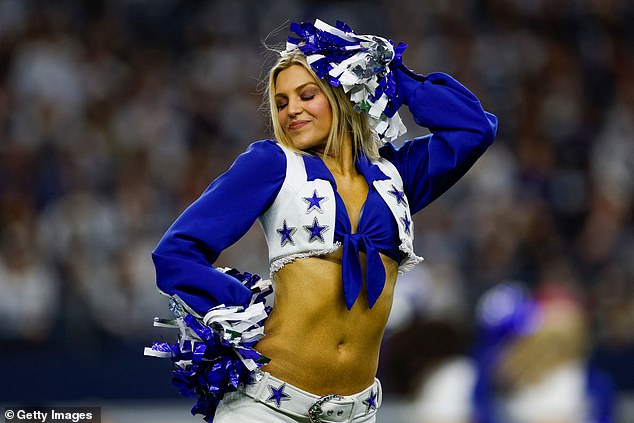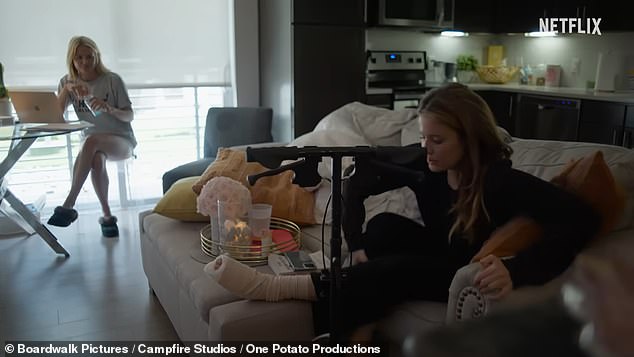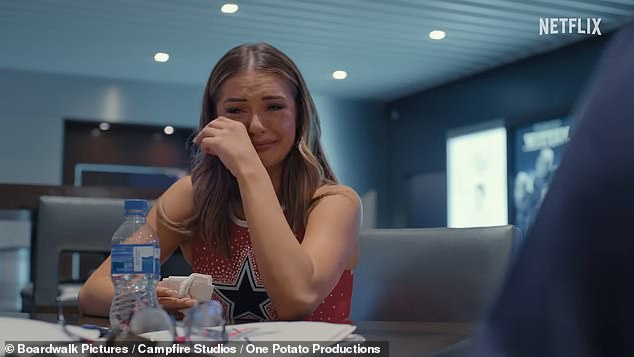EXCLUSIVERevealed: The dark secrets at the heart of America's Sweethearts Dallas Cowboys cheerleaders and the hit Netflix show that's captivated the world
They burst on to the pitch, a dazzling display of blues, silvers and whites. Radiating sex appeal, 36 perfect smiles and immaculately tanned, toned bodies form a line, all dressed in identical star-spangled hotpants and bright white cowboy boots. The stadium — holding 100,000 people — erupts.
These are the Dallas Cowboys Cheerleaders, America's most prestigious cheer squad.
Hailing from all corners of the US, they epitomise athleticism, skill, beauty, talent and homespun, God-fearing American values. You'd never guess that their flawless choreography — sky-high kicks, hip-shimmies, and jump splits — is the product of only 15 weeks of training.
The squad's story is the subject of a glossy seven-part Netflix docu-drama, America's Sweethearts: Dallas Cowboys Cheerleaders, which has stubbornly remained among the platform's most popular shows since its launch in late June.
Directed by Emmy award-winning filmmaker Greg Whiteley, the series documents the selection process for the 2023-24 cohort of DCCs (as they are known).

The Dallas Cowboys Cheerleaders, America's most prestigious cheer squad, endure gruelling training schedules

The squad hail from all corners of the US, they epitomise athleticism, skill, beauty, talent and homespun, God-fearing American values
It begins with 500 hopefuls who are whittled down, episode by episode via arduous auditions, to just 36 girls. These chosen ones will spend the year 'cheering' for the Dallas Cowboys football team — the most valuable sports brand in the world, worth a staggering $10.32 billion.
In part it's a tale of opulence, glamour and fantasies fulfilled. But there is also a much darker side — one of casual misogyny, abuse and gruelling regimes that can lead to life-changing injuries.
The series has gripped and appalled its millions of fans in equal measure and has had critics reaching for superlatives — in many cases to express their outrage.
One newspaper reviewer wrote that there is 'plenty to horrify' in the series, including the physical toll on the team members' bodies, the 'abysmal pay' and 'the objectification'.
Another said of the cheerleaders: 'At best, they're athletes working at the apex of their sport; at worst, they're casualties of a job market, a form of entertainment, and a society in which misogyny is so deeply ingrained, it's often enforced by the women it oppresses.'
Viewers have been equally shocked. One posted on Twitter: 'If you have a daughter or sister it'll probably shatter your heart… Every episode I've watched so far has made me cry.'
But the one thing everyone agrees on is that they can't turn it off. 'My God, this needed a trigger warning. So upsetting, but I cannot stop watching,' gushed another.
At the helm of America's Sweethearts are Kelli Finglass, the cheerleaders' formidable head coach and director, and Judy Trammell, the perfectionist choreographer. Their mission is to find cheerleaders who will uphold the supposed DCC legacy: glitter and God, smiles and 'sisterhood'.

The squad's story is the subject of a seven-part Netflix docu-drama, America's Sweethearts: Dallas Cowboys Cheerleaders, which has remained among the platform's most popular shows
The pair are responsible for the team of 'rookies' and returning team members. The rule is that cheerleaders can serve for up to five years but must re-audition annually, competing against a fresh pool of talent each time.
Both Kelli and Judy were Dallas Cheerleaders in the 1980s and are revered by the squad — even the harshest criticism is met with an obedient 'Yes Ma'am'. For the girls are all desperate for the prestige that comes with being a Dallas Cheerleader.
They grew up dreaming of becoming one of Dallas's — and America's — poster girls.
One of the country's best-known institutions, their uniform is displayed in Washington D.C.'s Smithsonian Museum, and they've performed with the likes of Queen and Dolly Parton.
In 2007, Barbie even released a special-edition DCC doll.
Like the pro football team they represent — whose players they are forbidden from fraternising with — the cheerleaders are elite athletes, expected to endure gruelling training schedules and to battle through injuries.
For the girls, however, their gig can seem even tougher.
To qualify as a DCC, the dancers must first of all have 'the right look'. In fact, one of the 'tests' during training camp involves simply trying on the team's signature skimpy uniform. If it doesn't look right, the problem is the body wearing it.
During 'try-ons', Kelli interrogates one girl about the distance from her belly button to her groin. She worries about another's eyebrows.
You only get your uniform fitted once. During your tenure as a DCC — which can be up to half a decade — it must always fit. It's not worlds away from the old DCC rulebook from the 1990s, which stated it was a 'breach of contract' for a cheerleader to gain weight.
We meet Victoria Kalina, who turns 24 during the series, the daughter of a former Dallas Cheerleader and family friend of the steely Kelli.
Despite her familiarity with the team, Victoria is the 'ugly duckling' of the group. She smiles too wide, tries too hard — and nobody seems to warm to her.
We learn that Victoria took a year out from the squad after struggling with her mental health. A friend tells the cameras how she flourished in the 'real world' — away from the DCC. A one point, Victoria sits cross-legged on a twin bed that seems too small for her, in a pink bedroom in her mother's home.

The show begins with 500 hopefuls who are whittled down, episode by episode via arduous auditions, to just 36 girls

The 36 chosen ones will spend the year 'cheering' for the Dallas Cowboys football team - the most valuable sports brand in the world, worth a staggering $10.32 billion
It's as if she hasn't grown out of her childhood dream. She admits she has struggled with depression and an eating disorder.
'When I look [at myself] in the uniform, I'm always like, oh, man, I need to lose at least three pounds,' she says. 'Whenever I get into a bad depression, I turn to bad coping skills, which causes bad eating habits. And as a dancer, the hardest thing you can fight are eating disorders plus depression.'
Yet Victoria, out of a perverse sense of duty or devotion, had returned for a punishing fourth year on the team. This month, it was revealed that she had left the Cowboys for good — choosing not to reapply for a fifth year.
'I think I did lose some of my love of dance,' she said. 'If you're giving, giving, giving so much and it's not being reciprocated — what's the point?' She now dances for the Radio City Rockettes, a New York City dance troupe, and I can't help but think: good for her.
One of the show's ugliest moments occurs when cheerleader Sophy Laufer files a police report after claiming that a game-day photographer touched her inappropriately.
Her fellow cheerleaders rally around her. But Kelli responds with raised eyebrows, seemingly shocked that she wants to press charges.
No mention is made of the fact that two years ago, the Cowboys agreed a multi-million-dollar settlement with four former cheerleaders. It followed allegations that Richard Dalrymple, the Cowboys' senior vice president of public relations and communications, filmed them in their changing rooms. Dalrymple denied the allegations, and the Cowboys said they found no proof of any wrongdoing on his part.
The physical rigours of being a DCC go far beyond staying thin. The DCC's best-known and longest-running routine is to the AC/DC song Thunderstruck. It features their iconic 'jump split', where dancers line up alongside one another, linking both arms on the next girl's shoulder, leaping high into the air, then landing on the ground while performing perfect splits.

But there is a darker side, one of casual misogyny, abuse and gruelling regimes that can lead to life-changing injuries

The series has gripped and appalled its millions of fans in equal measure and has had critics reaching for superlatives, in many cases to express their outrage
Because the girls are all linked together, a single mistake by one could injure any number of the others. 'I don't know who came up with that [move],' says Caroline Sundvold, a veteran cheerleader whose sister Anna Kate made the team this year. 'That's what rips up people's hips.'
Caroline, who completed her five years on the team and hobbles on crutches at points in the series, postponed reconstructive hip surgery to finish her final season in the squad. Meanwhile, her best friend Kat, another veteran, 'tore' both her hips during her time as a cheerleader and needed surgery to repair the cartilage.
But Kelli and Judy won't change the dance routine. 'The fans love it,' they shrug. And, bizarrely, so do most of the girls.
Poor, injured Caroline seems lost now that she's no longer part of the DCC. Still missing the squad, she lives with Anna Kate and accompanies her to practice.
'People say each chapter gets better. But does it always get better? I hope for me, the best is yet to come. But when I'm sitting here day after day, it's easy to think, 'Did I just leave behind the best years of my life?' '
One thing is for sure. Caroline, who now appears to be working as an account manager for a medical equipment manufacturer, will be earning more than she did in the Cowboys. Exact salary figures are elusive, but in the first episode, veteran cheerleader Kat reveals she made the same as a full-time worker for Chick-fil-A, an American fast-food chain.
Nor are we told in the series that their wages only increased after a former cheerleader, Erica Wilkins, sued the Cowboys in 2018 for being paid less than minimum wage, and the person who dresses up as the football team's mascot earned more than the cheerleaders. The Cowboys settled, and the cheerleaders' game-day pay reportedly increased from $200 to $400 per game.
Given the pittance they are paid, many Dallas Cowboy Cheerleaders juggle multiple jobs. Fifth-year squad member Kelsey Wetterberg, for instance, works as a paediatric nurse. She tells the cameras: 'DCC is more of a part-time job — as a nurse, I work 7.30am to 4.30pm, then go to practice and get home at midnight, sometimes 1am.'

The girls burst on to the pitch, radiating sex appeal, 36 perfect smiles and immaculately tanned, toned bodies as they form a line, all dressed in identical star-spangled hotpants and bright white cowboy boots
Other members include a dentist and a financial planner. They must attend practices for at least 20 hours weekly, in addition to working game days and making other appearances during the 18-week NFL season and the 15-week training camp. In one episode, it's revealed that the squad had to work 21 days straight.
'A lot of us work full-time jobs and then come to DCC at night, so it can be really exhausting,' Kelsey says. 'You give up a lot, but it's five years of your life.'
While Dallas Cowboys football players, who earn on average $2 million a year, can boost their salaries with sponsorships, the cheerleaders are prohibited from doing so or from signing with social media influencer agencies.
Charlotte Jones, the team's brand director and daughter of Cowboys owner Jerry Jones, acknowledges their disparity.
'But the facts are, they actually don't come here for the money,' she says. 'They come here for something that's actually bigger than that to them. They have a passion for dance. It is about a sisterhood that they are able to form, about relationships that they have for the rest of their life.'
That's the ideal the girls buy into, anyway. 'I love you so much!' they tell each other constantly. 'I'm so proud of you!' 'You look so cute.' They become best friends in a matter of days and sob hysterically when girls are cut from the team.
Nobody is as much of a girl's girl than newbie Reece Allman. In America's Sweethearts, Reece is the star of the show. Impossibly beautiful, a great dancer, and a devout Christian — she embodies the DCC ideal.
During her interviews, soft-spoken Reece explains that her dancing skills are a gift from God. All she wants to do when she 'cheers' is deliver glory to Him.
When people watch her, she wants them to see Jesus. She also tells us that she is engaged to the first boy she ever talked to, Will — who seems to be punching far above his weight in winning Reece — and that he got a job at a power-washer dealer in Dallas so he could be with her.
The coaches seem to love the fact she straddles the dichotomy between girlish innocence off-pitch and fierce sexuality when performing her high-kicks.
But religion certainly plays a role in what seems sometimes to be the job from hell. Dancers are filmed praying before meals and attending evangelical church services ('God. Loves. DALLAS!' cries one pastor). 'I just don't think it's in God's plan for me,' admits one dancer when Kelli cuts her from the team.
For those, like me, with weaker faith, the story of the Dallas Cowboy Cheerleaders doesn't seem one of empowerment. Instead, it's one of soul-destroying exploitation.
Indeed, episode six of America's Sweethearts features Dolly Parton performing her hit 9 To 5 at the halftime show of the Dallas Cowboys' Thanksgiving game last autumn. 'Workin' nine to five, what a way to make a livin' / Barely gettin' by, it's all takin' and no givin',' she croons as the squad shimmies in sequence.
Parton wrote those lyrics back in 1980s Tennessee — but they couldn't seem more appropriate under the bright lights of Texas's AT&T Stadium today.








































































































































































































































































































